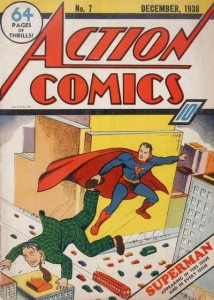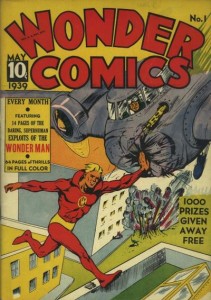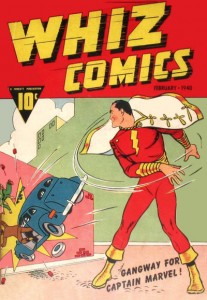Except for us lawyers, most people find reading cases tedious at best. There’s no doubt that a fifty page opinion about copyright and contract law would cure the most severe case of insomnia. Nevertheless, those of us in the profession enjoy a well reasoned opinion, especially when it touches upon some issue that is near and dear to our hearts. Of course, I learned a long time ago to avoid mixing what I do for a living with my hobby. Reading and enjoying Golden Age comic books is a welcomed refuge to the stresses of my “day job”. But for whatever reason, my curiosity got the best of me the other day and I started looking at some of the old cases where DC decided to use the litigation process to protect its biggest asset, Superman.
DC didn’t waste any time in the Golden Age and went after Bruns Publications and others in the 1939 case of Detective Comics, Inc. v. Bruns Publications. In this suit, DC sought an injunction to stop Bruns from publishing its Wonder Man feature in the pages of Wonder Comics #1 (May 1939) as drawn by the great Will Eisner. DC’s suit was successful, and Judge Woosley of the United States District Court for the Southern District of New York issued an order on April 7, 1939 finding that Wonder Man was indeed a violation of DC’s copyright of the Superman stories in Action Comics 1-8. As stated by the Court, “I have gone through all the plaintiff’s magazines and the defendant’s magazine, and I find that in the one copy of the defendant’s magazine which has come out,- the May, 1939, number of the magazine called ‘Wonder Comics‘ – there has been unfair use by the defendant of the plaintiff’s copyrighted pictures and unfair paraphrase of the plaintiff’s text accompanying its pictures.” This opinion was affirmed in 1940 by the United States Circuit Court of Appeals for the Second Circuit and Wonder Man was no more.
Later, in the much publicized case of National Publications, Inc. v. Fawcett Publications, Superman and Captain Marvel waged war over whether Captain Marvel and the Marvel Family were being published in violation of DC’s Superman copyright. This litigation which was initiated in 1945 went on for many years. Initially, DC lost the battle in the District Court for the Southern District of New York. In fact, in that opinion dated April 10, 1950, District Judge Coxe, while finding that Fawcett had indeed violated DC’s copyright of Superman, ruled against DC by finding that DC had abandoned it’s copyright of Superman by publishing the adventures of its greatest asset in the newspaper between 1939 and 1944 without proper copyright notices. Wow! But all was not lost. The great jurist, Learned Hand of the United States Court of Appeals for the Second Circuit in an opinion dated August 30, 1951, reversed the abandonment finding of Judge Coxe, but affirmed the finding of Fawcett’s copyright violation. In this landmark copyright case, Judge Hand held that, “We are unwilling to allow a barefaced infringer to invoke an innocent deviation from the letter that could not in the slightest degree have prejudiced him or the public.” So, Superman may have lost a battle along the way, but he ultimately won the war. This decision led to a 1954 settlement of the case whereby Fawcett paid DC $400,000 and agreed to never again publish its Captain Marvel related titles.
While these were important cases, none were more serious and far reaching than the series of litigation between DC and Superman’s creators, Jerry Siegel and Joe Shuster that began in 1948.
Coming up next: Litigation, Golden Age Style – Part 2





Pingback: Litigation, Golden Age Style – Part 2 – Golden Age of Comic Books